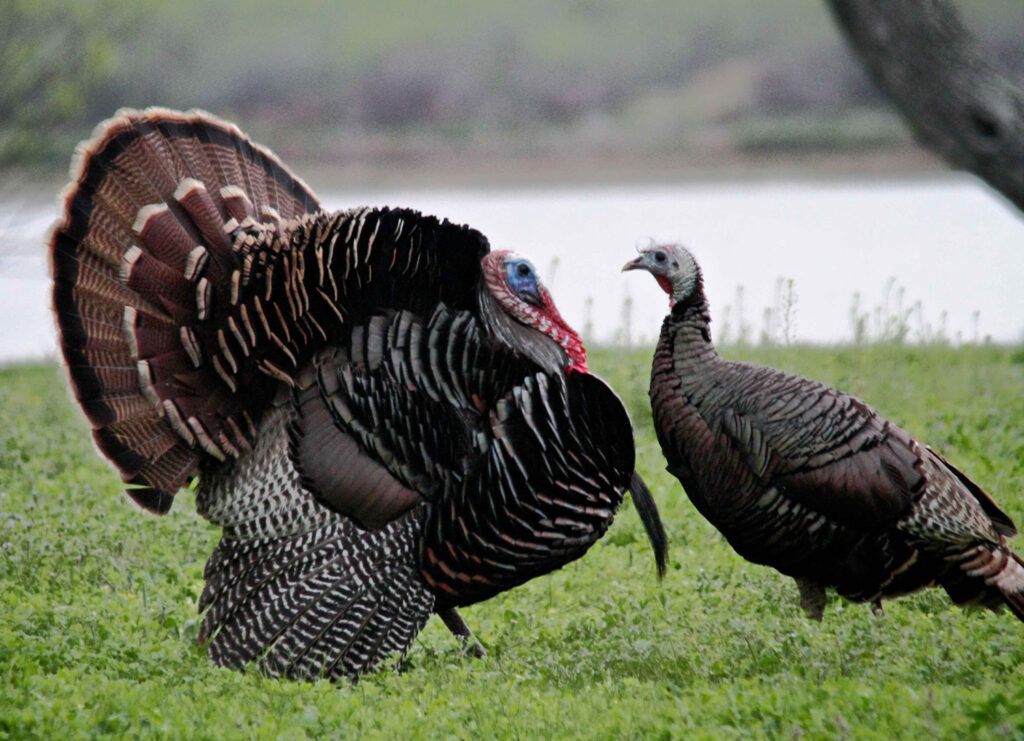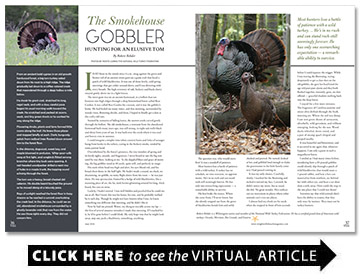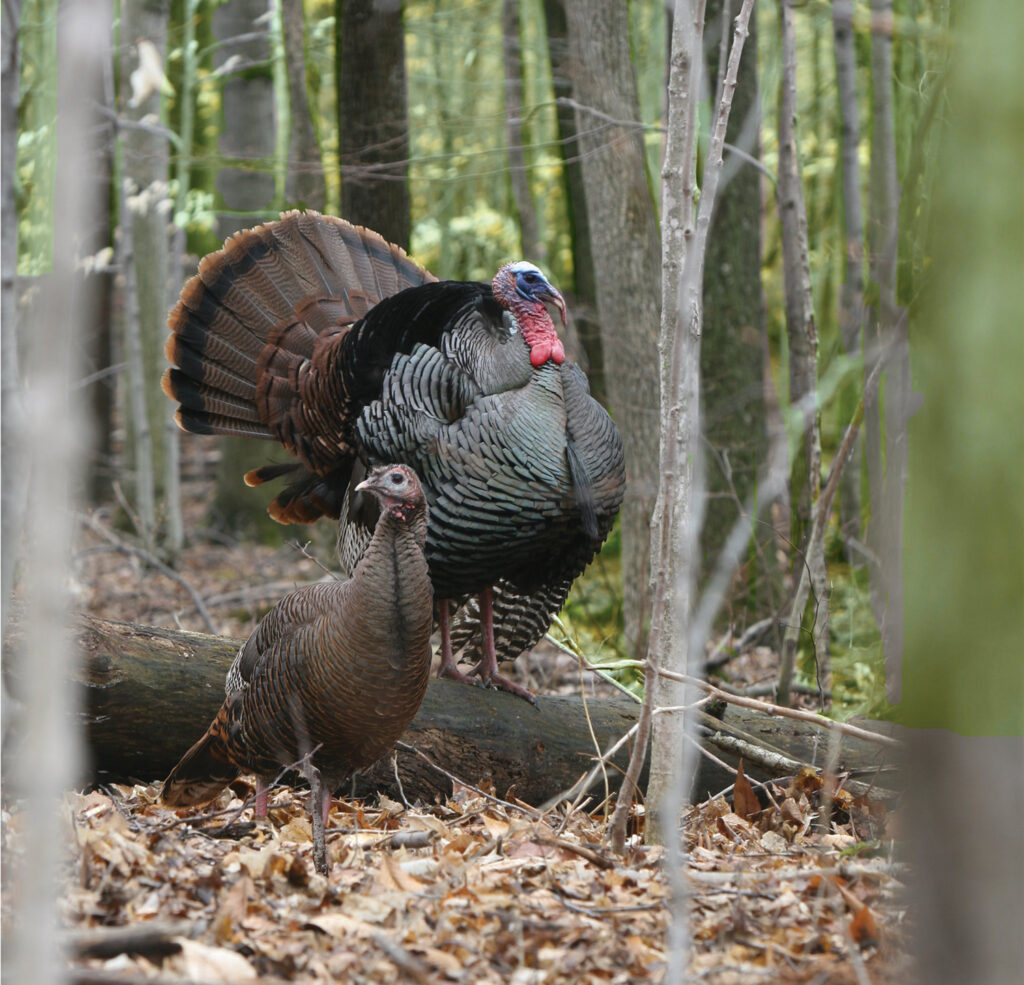
From an ancient bald cypress in an old growth hardwood forest, a big tom turkey sailed down from his roost to a high ridge. The ridge gradually led down to a coffee-colored creek that meandered through a deep hollow a mile below.
He shook his giant coat, stretched his long, regal neck, and with a slow, careful pace began his usual morning walk toward the creek. He scratched and pecked at acorns, seeds, and tiny green shoots as he worked his way along the ridge.
Flowering shrubs, plants and ferns formed little rooms along the trail. He knew those places and stopped briefly at each. Dark, burgundy petals from redbud trees floated down around him to the forest floor.
In the distance, dogwood, sweet bay, and maple bloomed in profusion. Whip-poor-wills sang at first light, and songbirds flitted among branches where tiny buds were opening. A red-headed woodpecker drilled a neat row of holes in a maple trunk, the tapping sound echoing through the forest.
The tom was a heavy, broad-chested old veteran. His double beard touched the ground as he moved along at a leisurely pace.
Rays of sunlight reached the forest floor in hazy streams as he reached a summit overlooking the creek bed. In the distance, he could see an old, abandoned smokehouse surrounded by a ghostly lavender mist that rose from the water. He saw those sights every day. They did not concern him.
I had been in the woods since 4 a.m., snug against the green and brown veil of an ancient sweet gum on a game trail that faced a patch of wild blackberries. It was one of those lovely, cold spring mornings that got colder around dawn, and I was shivering with every breath. The high overstory of oak, hickory and black cherry swayed gently above me in a light breeze.
The sweet gum was on an ancient farmstead, in a hollow that ran between two high ridges through a deep bottomland forest called Bear Garden. It was called Bear Garden for a reason, and it was the gobbler’s home. He had fooled me many times, and that morning, surrounded by woody vines, flowering shrubs, and ferns, I hoped to finally get a shot at the crafty old tom.
Stained by centuries of falling leaves, the narrow creek curved gently through the hollow. The old smokehouse, a remnant from the abandoned farmstead built many years ago, was still strong, its tight oak walls black and shiny from years of use. It was built over the creek where it was cool and breezy even in summer.
I could imagine a simpler time when country hams and links of sausages hung from hooks in the rafters, curing in the hickory smoke, tended by some patient hand.
Overwhelmed by the forest’s presence, the tiny wonders of spring and its lovely sights, sounds, and fragrances, I never heard or saw the big tom until he was there, looking at me. In the dappled blues and grays of morning, the big gobbler stood at 40 yards, quite still, and perfectly in range.
His stark white head was high and alert, his eyes blood red, and his broad chest shone in the half light. He hadn’t made a sound, no cluck, no drumming, no gobble, no noisy flight down from his roost — he was just there. He was spectacular, framed by a hedge of wild blackberries, like a stunning piece of art, the fat, dark berries glistening around his long, thick beard, his eyes on mine.
Luckily, I hadn’t moved. I was well hidden and puzzled that he could see me at all. But I knew this was his home, his tree, and he probably walked by it each day. Though he might not have known what I was, he knew something was different that morning, and he didn’t like it.
Now he had me pinned. Worse, my shotgun was idle across my lap — the first of several amateur mistakes I made that morning. If I reached for it, he’d be gone before I could blink. My only hope was that he might look away, step out, peck a blackberry, something, anything.
The question was, who would move first? It was a standoff of patience.
Most hunters lose a battle of patience with a wild turkey. A turkey has no schedule, no time restraint, no appointments. He’s in no rush and can stand rock-still seemingly forever. He has only one overarching expectation — a remarkable ability to survive.
His hen broke the trance. Where she came from, I’ll never know, but she silently stepped out from the grove of blackberries beside him and softly clucked and purred. He turned, looked at her, and gobbled loud enough to shake the gravestones in the little family cemetery I had passed coming in.
It was my only chance. Carefully, slowly, I reached for the Browning and inched it toward my face. Lovesick, he didn’t notice my move, but as usual, she did. No great wonder. Hen turkeys can see movement in places where other animals can’t even see places.
I almost had my cheek on the stock when she stepped in front of him seconds before I could squeeze the trigger. While I was waving the Browning, trying desperately to get a clear shot on the old gobbler, she gave her boyfriend the age-old putt-putt alarm and they both flushed together, instantly, gone, no shot offered — graceful shadows melting back into the deep forest.
I stayed for a few more minutes. The fragrance of Carolina jasmine and sweet olive drifted through the fresh, morning air. Where the soil was damp, I saw new green shoots of sarracenia, silverbells, wild geranium, and trillium emerging, looking for the sun. Wood ducks whistled, doves cooed, and a pair of swamp quail chirped and peeped nearby.
It was beautiful and bittersweet, and it occurred to me again that, whatever happens, I am only a guest in such a magnificent forest.
I smiled as I had many times before, wondering how a 20-pound gobbler could silently slip through a patch of wild blackberries that would snare a 1-pound rabbit, and how a hen can materialize from nowhere, see behind her with either eye, and hear a car door slam a mile away. How could she step in the one place that I could not shoot?
Scientists say that wild animals don’t have the ability to reason, that they only react by instinct. They must not be turkey hunters.
Robert Rehder is a Wilmington native and member of the National Wild Turkey Federation. He has a certified grand slam of American wild turkeys: Osceola, Merriam, Rio Grande, and Eastern.



